LastSwab vs EarthSider Review [How to Avoid Zero-Waste Greenwashing]
A detailed, honest review of the pros and cons of all of LastObject’s reusable products (LastSwab “cotton” swabs, LastRound cotton pads, and LastTissue) and exactly why they’re more sustainable than the competition.
What’s your biggest pet peeve? If you know me, you probably know that I can’t stand anything fake. Things, people or companies that claim to be something they’re not drive me absolutely mad. And the market for eco-friendly, natural, zero-waste, or any other category of sustainable products is absolutely flooded with fakes.
Two brands make a great example of this problem: LastSwab (the original) and EarthSider (one of many knock-offs). I tested both companies’ reusable “Q-Tips” for this review, and the difference in quality was clear.
This Danish company is the original inventor of the reusable Q-tip (LastSwab), and designs lots of other brilliant replacements for throw-away items. My favorites are their washable replacements for cotton pads and tissue boxes.
Use tiltedmap10off to save 10%.
That’s why I wanted to call attention to this problem (a type of greenwashing) in the zero-waste world, and also share some tips for how to spot fake zero-waste brands (below).
What is LastSwab?
LastSwab is the first reusable “cotton” swab (AKA, Q-Tip, cotton bud, you know – the things you stick in your ears even though you’re not supposed to). It’s far less weird than it may sound. LastSwab launched through crowdfunding in 2019 by a Danish start-up called LastObject, which I’ve become a big fan of.
Their mission is sustainability through design: They invent reusable replacements for single-use products.
And LastObject is ahead of the curve even for Europe, where many single-use plastic items have been banned as of 2021! And that makes them way ahead of the curve in the US. (Canada is basically doing the same thing as Europe.)
You can use any LastObject link in this article or the discount code tiltedmap10off for 10% off any order. (You can also find LastObject products in some local shops.)
Keeping Oceans Plastic-Free
LastObject also collaborates with Plastics For Change to remove 1 kg (about 2 pounds) of Ocean-Bound Plastic for every order. (Plastics For Change is a social enterprise that pays people in developing countries to collect and turn in plastic, which would otherwise end up in the environment, for recycling.)
This started out as LastObject’s alternative to Black Friday in 2020, as a temporary promotion, but it’s now a permanent feature of their sustainability efforts.
They then use Ocean-Bound Plastic to create the cases for LastSwab and LastRound.
What about the LastSwab knock-offs?
LastSwab is a great example of an eco-friendly product that has been aggressively counterfeited from the moment it was clear people were interested in it.
I talked with Isabel Aagaard, one of three founders of LastObject, about this. She said it only took three days after they launched their Kickstarter campaign for the first fakes to show up online!
“It’s not that we don’t want other people in the market. We’d love if they did quality products – if they did a quality swab that would actually last. But because they’re doing crappy versions of our products, they’re actually creating more waste.”
Isabel Aagaard
So many companies knocked-off the original LastSwab design that Isabel said she couldn’t even remember them all. FinalSwab and EarthSider are two of the most prominent counterfeiters. (FinalSwab even has the exact same questions and answers on their FAQ page as LastSwab – literally cut-and-pasted right down to the emojis.)
Amazon & Fake LastSwabs
Of course, Amazon sells a lot of fake products. So Isabel told me LastObject decided to sell on Amazon, too. That way, they could at least compete with the fakes when people search for “reusable Q-tips” on Amazon. She said it should also help because Amazon wants to show their authentic products over the counterfeits – because theirs are higher quality, so fewer people will return them, and that makes life easier and margins higher for Team Bezos.
(When I searched for “reusable qtips” and even for “lastswab,” the only legitimate LastSwab store on Amazon did come up first, but a bunch of fakes were right next to it.)
What is Greenwashing?
Counterfeiters are a particularly bad example of “greenwashing,” a term for companies trying to make themselves look sustainable, because they know lots of people want eco-friendly products. So they find a way to label their cheap junk “green,” jumping on the sustainability bandwagon to make a profit.
[For another type of greenwashing, see my post about TerraCycle and recycling.]
I heard a similar story from 100 Senses – a California company that makes my favorite plastic-free shampoo and body wash bar, which I reviewed in another post. They emailed me this:
“Many soap brands are slapping the words “shampoo bar” on their soaps, which are not actually formulated for shampooing, and certainly not optimal for the skin and hair.”
100 Senses
It’s one thing when a fake is just less enjoyable than the original (like imitation flavorings or “lite” beer – two other things I can’t stand). But it’s way worse when fakes steal from the original creator and cause more harm than good. Because, just like Isabel said, the junk that counterfeiters sell will end up being thrown away – just like the disposable items they’re supposedly replacing.
Plus, one bad experience can make people weary of legitimately sustainable brands and high-quality reusable products.
So here are my reviews of the entire, original, LastObject line-up:
LastSwab Review (Reusable Q-Tips)
Compared to disposable cotton swabs, reusable Q-tips do take some getting used to. Since they’re not made of cotton, of course they don’t absorb moisture, but the little nubs do a good job of collecting whatever’s built-up inside your ear. It’s a different concept, but if you keep an open mind it’s not hard to adapt to.
I found the original “basic” swab more useful than the “beauty” version, which is designed for makeup touch-ups. I keep the basic on the shelf in my shower, in its storage case, use it to clean my ears, then rinse it.
The material used for the beauty swabs is just a little bit harder than the original, and I think it makes it tough to do touch-ups or wipe away excess eye makeup without dragging my skin a little. (Although LastSwab’s FAQ page recommends dipping them in makeup remover for touch-ups. Instead, I usually end up ripping off a tiny corner of toilet paper, adding a drop of water, and using that on the end of the beauty swab.)
Bonus: LastObject offers separate mirrors that you can attach inside the beauty swab case to create a handy little compact. What I love most about the concept is that it’s an add-on (a very affordable one). Meaning if you don’t want it, they don’t sell it to you – and it doesn’t become another piece of waste in your medicine cabinet. Win-win.
Are Reusable Cotton Swabs Safe?
In short, yes. From everything I’ve read from experts, and from my own experience actually using reusable cotton swabs for almost two years, I’m confident in saying that reusable Q-tips are just as safe and hygienic as the disposable kind.
(Obligatory safety note: As with any cotton swabs, don’t jab the reusable ones deep into your ears.)
Some obvious hygiene tips – you have to keep your swabs clean, but luckily that’s easy to do with all LastObject products. Just gently wash the swabs by hand with soap and water. You can also disinfectant them with rubbing alcohol or other disinfectants, if you like.
LastSwab Baby
2021 Update: LastObject recently launched LastSwab Baby with a petite little snowman shape for cleaning petit little ears. I sent baby swabs to the two sets of infant-parents in my life, and they’re said they work just as well as the identical, disposable baby Q-tips!
(LastObject recommends using the baby swabs for children, too, not just infants.)
One notable difference is you can’t steam-clean the Baby LastSwabs in the microwave. This is a common way to clean infant products, but I checked with the company, and they said LastSwabs aren’t tested for high-heat cleaning. But you can disinfect them with rubbing alcohol or other disinfectants.
Q: Why not just use biodegradable swabs made from cotton and paper?
Whether your Q-Tips are made of plastic and cotton, paper and wood, or alternatives like hemp and bamboo, the problem is that they’re single-use. Those materials still have to be farmed (using chemicals, water and land), harvested, shipped to a factory, turned into the final product, packaged (often in plastic), and shipped again to a store or warehouse.
After all that effort – and all those carbon emissions and pollution – they’re used for 10 seconds and thrown away.
And this is all new! It’s only in the last few decades that we’ve created this throw-away product lifecycle.
Even the cotton swabs labeled “biodegradable” are not much better. As LastSwab explains it on their website:
“If you bury a paper swab in a landfill and go back in five, ten, fifteen years, they still wouldn’t biodegrade. Even a banana peel, if left without light and air, would continue to be a banana peel years later.”
LastObject
Biodegradable doesn’t mean compostable, and both require specific conditions to break down. So the best option is to just avoid as many single-use products as we can.
And LastObject is making an entire arsenal of reusable products just for that purpose.
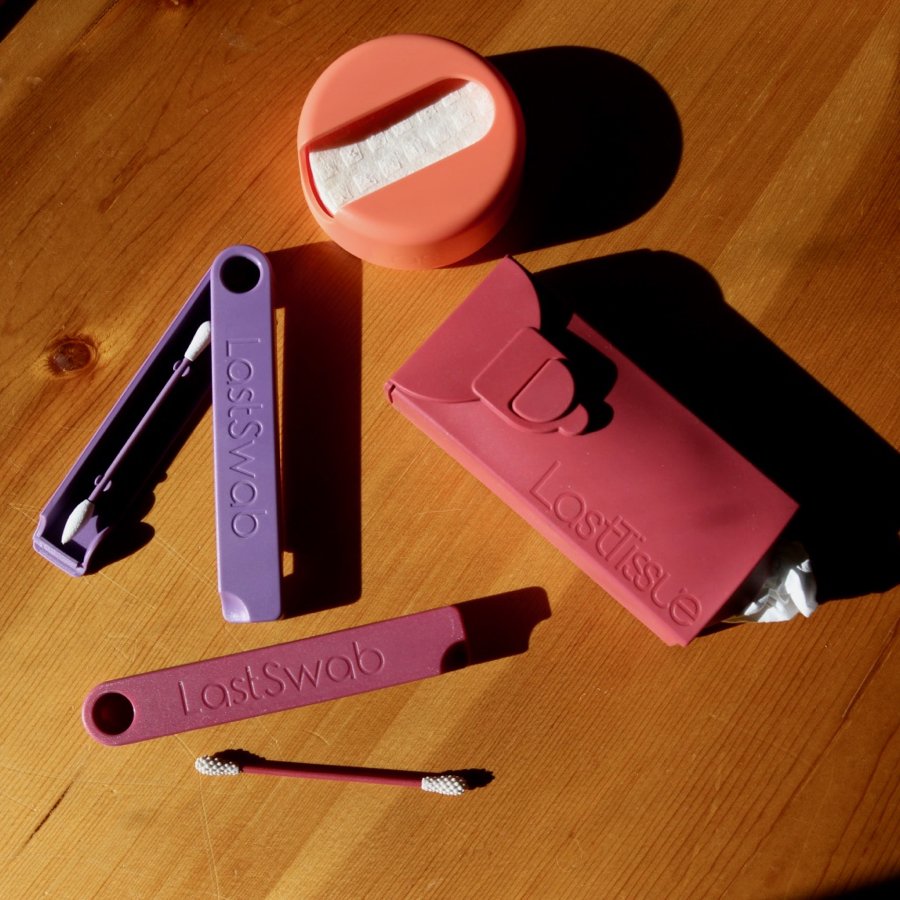
Beyond reusable Q-tips, LastObject made two other single-use replacements when I first published this review: LastRound (to replace cotton pads or cotton balls) and LastTissue (to replace portable Kleenex packs and boxes).
My reviews of those are below, and Isabel told me they’re working on five or six more reusable toiletry items, so I’m excited to see what they come up with next!
You’ll see more reviews added below as they’re launched.
(If you’re interested in all LastObject products, or want multiples to give as gifts, you can save some money with LastObject kits and gift sets.)
LastRound Review (Reusable Cotton Pads)
LastRound cotton pads were LastObject’s third invention (after LastSwab and LastTissue), and so far they’re my favorite. I think cotton pads are one of the easiest reusable products to get used to – they’re almost indistinguishable from regular disposable cotton pads/balls. (In fact, that’s one thing to keep in mind: the LastRounds look and feel so similar to disposable cotton pads that you have make an effort to remember not to automatically toss them in the trash!)
The rounds are 70% wood, 30% organic cotton, and they feel rough when they’re dry, but as soon as you wet them with water or toner, they’re perfectly soft.
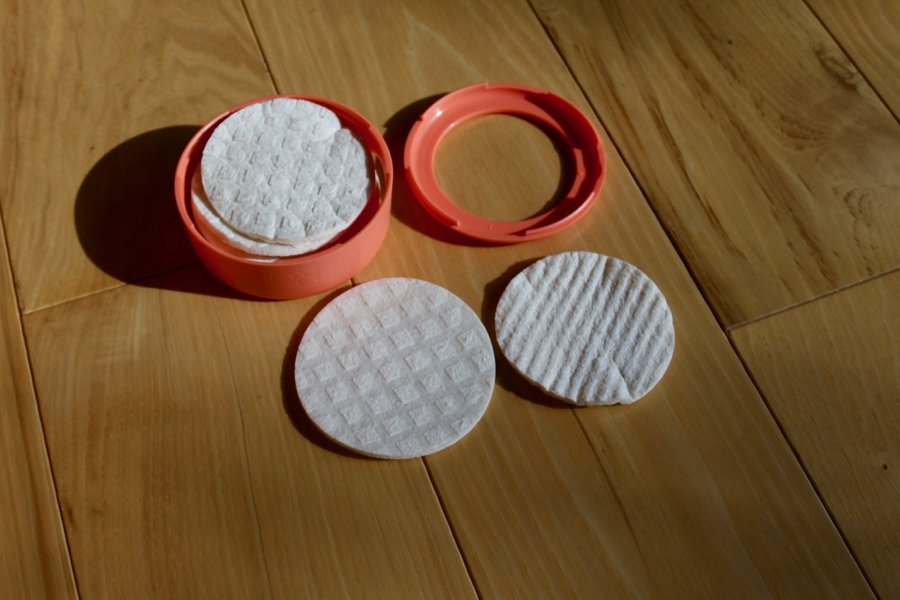
LastRound is made in Denmark in a sustainable factory that recycles its water. (Some of their other products have been made in China, but not every Chinese factory has the same working conditions or environmental record.)
And water conservation is a part of what makes LastRound more sustainable than disposables – LastObject says each round saves 10 liters of clean water needed to produce disposables. (Cotton is a water- and pesticide-intensive crop, so growing it just to throw it away doesn’t make much sense.)
LastRound Refills
2021 UPDATE: LastRound now offers a 21-pack of refill rounds, which you could also order instead of the standard LastRound kit if you don’t need the case.
Unfortunately, most companies don’t make it this easy to say NO to buying extra packaging or unnecessary replacement products. This is expensive for brands, as offering more options complicates their websites, warehouses and shipping, but LastObject does it anyway because it’s the more sustainable choice. Steps like this are one of the reasons I love this company.
Alternatives for cotton rounds:
The Earthling Co. makes reusable bamboo rounds that I like for two reasons: They come in a pack of 20 and come with a washing bag, and without any kind of case. (I haven’t tried these either, but I love most other Earthling Co. products, starting with their shampoo and conditioner bars, which I reviewed here.)
You can also save 15% on every order from The Earthling Co. by clicking through any link on my blog (no discount code needed).
Another option to replace cotton rounds are these reusable bamboo rounds, from TruEarth (a company I reviewed in this post about plastic-free cleaning).
I haven’t tried these but I do like one thing about them: They’re colorful, which would be helpful to keep from losing them, and as a reminder not to toss them in the trash!
How to Wash LastRounds
- You can toss used LastRounds in a washing bag to keep them separate from the fresh ones (as I describe below), or let them dry on your bathroom counter and then slip them into the back of the LastRound case for safe-keeping until it’s time for laundry.
- (LastObject recommends not putting the rounds back in their case wet. At first, I ignored this advice, because the case is open on both sides, so I thought they would still dry quickly. But then I noticed that if I put even one round back in damp, it didn’t dry for a couple of days.)
- LastObject also recommends using a water temperature of 140°F / 60°C, which is hot, so I generally ignore this advice, too, but with better results! To save energy, I almost always wash my LastRounds on the cold or cool setting (using sustainable laundry detergent from either TruEarth or Dropps, which I alternate between). They always come out fresh and clean.
- Then let the Rounds air-dry. (On that point, I don’t fight the official advice.)
My full review of TruEarth, Dropps and other low-waste cleaning and laundry products has details. And I have some good discount codes for both brands:
LastTissue Review
Frankly, I didn’t have much hope for LastTissue – a reusable “Kleenex” pack with a carrying case – when I first saw it, but the ease-of-use has surprised me.
I thought the organic cotton “tissues” would be too thick and stiff to use comfortably, but they actually work perfectly well, and they soften up with a couple of washes.
(Note from the future: I’m updating this is in 2022, and I can tell you that LastObject has definitely improved the texture and softness of the LastTissue material, compared with the original version they released in 2020.)
Bonus if you have allergies: I’m finding that the reusable LastTissues irritate my nose less than disposable paper tissues, which are rougher and shed little fibers everywhere. They’re a great help for raw winter skin, too.
Of course, another alternative to LastTissue is to just use regular washable handkerchiefs (I still have a collection of them from my grandmother).
You could definitely do that. And of all the LastObject products, this is probably the most… symbolic. But it’s also one of the easiest to get used to.
What I mean by “symbolic” is it’s not like a reusable alternative to single-use tissues didn’t already exist. I think one of the main points of LastTissue is that it’s a reminder to seek out ways to avoid even the most innocent-seeming disposable items, like individually plastic-wrapped tissue packages. So if you don’t already have a collection of handkerchiefs, LastTissue is a great option.
Another benefit is that the LastTissue carrying case, which is sturdy and handy, can be washed in the dishwasher.
It does tend to come open easily when tossed in bottomless pit of a purse. (A snug pocket is a better plan.) At home, I keep mine in my bathroom drawer, along with a laundry bag to collect both my used Tissues and Rounds.
LastTissue Refills
If you go through a lot of tissues, LastObject makes tissue refill packs to load in your carrying case while the other set is being washed.
Just like with the LastRound Refills, I love that you don’t have to buy a second carrying case if you don’t need it!
LastTissue Box – A New Favorite!
2021 UPDATE: LastObject just launched “LastTissue Box,” a refillable replacement for full-sized tissue boxes! I’ve been using it instead of my original, portable LastTissue in my bathroom, and I must say it’s a step up. It’s much easier to use (just pull the tissues out like a normal Kleenex box), and the tissues themselves have been upgraded – they’re softer and smoother than the original material.
How to Fold LastTissue
For the original LastTissue system (in the portable case), I just fold the tissues roughly in quarters (hotdog-style, if that means anything to you), roll each one up, and stuff them into the case. I try to keep the loose ends of the roll pointing down, so that the tissues are easier to pull out of the slit in the bottom of the case.
For the LastTissue Box, there’s more of art to folding the tissues. It matters more to do it right, so the tissues actually pop up out of the box, but it’s really easy: Fold a tissue in half, place half of the next tissue into the fold, and repeat, so that each tissue is linked to the tissues both above and below it. Then slide the whole stack into the tissue box.
How to Clean LastTissue:
Both the tissues and rounds are machine washable. You can follow the same laundry instructions (above) for LastTissue as for LastRound.
LastObject also makes their own organic cotton washing bags for this purpose. (You don’t want these tiny items getting lost in the wash, and the protection of the bag keeps them in better shape longer.)
More on those below:
Mini-Review: LastObject Washing Bags
LastObject makes a small bag designed for LastRound, and a larger one for LastTissue. I have both, but I recommend the large one no matter which products you’re planning to use it for. (I wash everything delicate in laundry bags, so I can always fill the extra space. And, as you can see, the small bag is really small.)
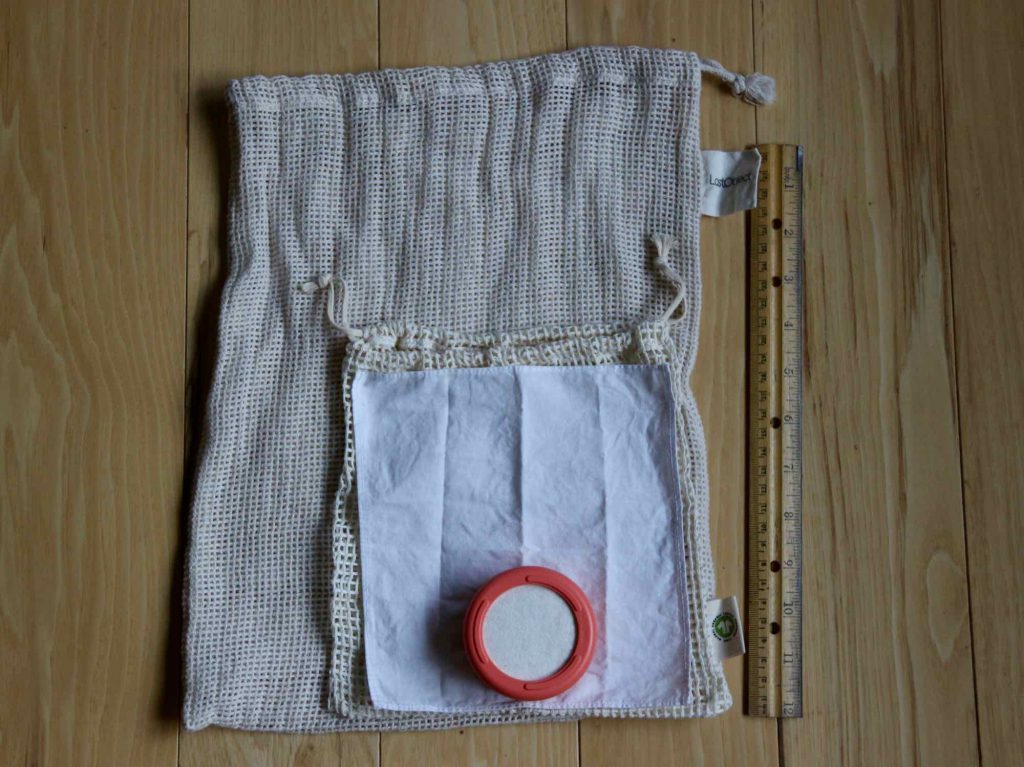
As you can see above, LastObject’s small laundry bag is almost exactly the same size as a LastTissue – so it wouldn’t be useful for washing anything except LastRounds or other tiny items.
One thing to keep in mind is neither LastObject bag has a zipper, so you have to remember to tie a knot in the string before throwing it in the wash. (I tried just cinching the bags closed. No go.) They actually did this on purpose though, because zippers are made of plastic and metal, while these bags are just 100% organic cotton.
Alternatives: You can also order these bags, which I got on Amazon and use for almost everything, as I describe in my review of some zero-waste laundry products. (I like them because they come in sets with multiple sizes.)
LastMask Review
LastObject’s first new product of 2021 is LastMask x Spray. Besides being a bit of a clunky name, it’s a reusable face mask and refillable hand sanitizer spray bottle in a silicone carrying case. They launched the set on IndieGogo, and it’s now available to order directly from LastObject (as of April, 2021).
The hand sanitizer bottle – which is very tiny – comes empty. But I just filled it with my favorite refillable, plastic-free hand sanitizer (which also made my master list of sustainable toiletries). That’s working fine, so no issue.
It does feel odd that LastObject chose to make the little sanitizer bottle out of plastic, but honestly the problem with plastic isn’t using it at all – it’s using it for things that are meant to be disposable.
The only other thing I find strange is that the silicone case comes in multiple colors, but the mask comes comes in just one (pale) flesh tone. I’d prefer it were solid black, instead of feeling like it’s supposed to blend in with your skin (which gives kind of a weird, mouth-less look anyway) but only if you have one skin color.
Having said all of that, I do find that the little LastMask set is more useful than I expected. It’s perfect to leave in your bag or car as a backup, in case you forget your mask or sanitizer. The ear loops are easy to adjust and stay in place, and the nose piece adapts to your face well without poking.
EarthSider Review – and Lessons Learned
Okay, that’s the end of my main reviews of LastObject’s line-up. Now, on the “cautionary tale” reviews.
The first EarthSider products I saw advertised were their reusable Q-tips, which have a very similar design to LastSwab’s. I had already read about LastObject and knew they were the original inventors – so I was skeptical, but I decided to order a swab from EarthSider anyway for the sake of comparison.
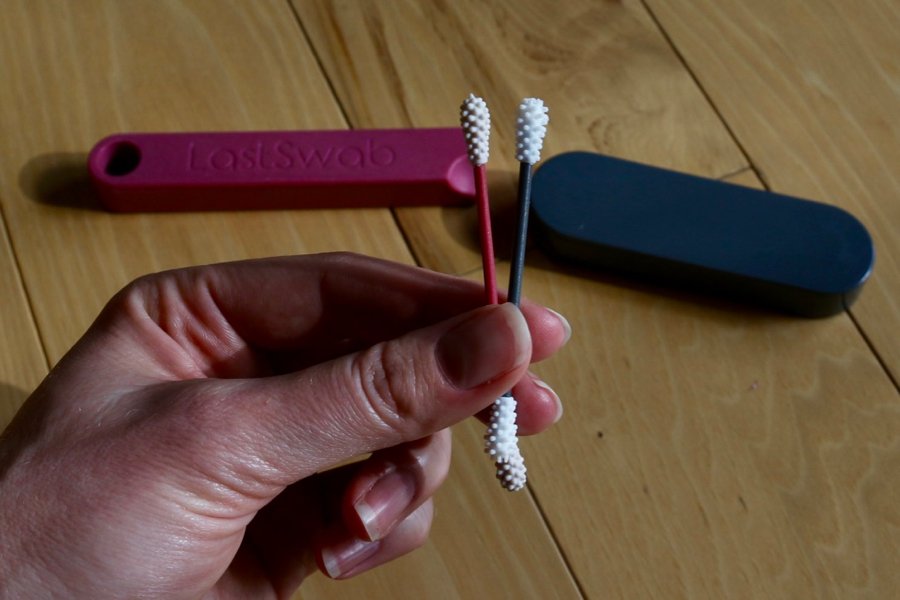
The first red-flag was that the EarthSider package arrived in a black plastic bag. Any plastic packaging would be bad enough, but black plastic, specifically, isn’t even recyclable in most facilities.
Every legitimate sustainable brand I’ve ordered for these reviews – including LastObject, and all the companies I tested for my reviews of shampoo bars and cleaning products – shipped in minimal packaging without plastic. Most use corrugated cardboard (the most easily recyclable kind), with paper packing tape instead of plastic, and often compostable interior packaging. So a supposedly sustainable company shipping items in black plastic just doesn’t make sense.
When I tried the counterfeit EarthSider swabs, I quickly realized that the silicone tips (what would be the cotton part of a disposable Q-Tip) detach from the stem very easily – including inside my ear. (I tried pulling the tips off of my LastSwabs and they don’t budge.)
Also, the material of the basic EarthSider swab is much softer than LastSwab’s (too soft), which makes it not as good for scraping dirt out of your ear.
If you’ve ordered from a phony sustainable company like this, don’t feel bad!
Their websites and social media are designed to look like they care about helping people reduce their environmental impact. And, like all online scammers, they count on people not having time to scrutinize a website for signs of phoniness.
So I came up with five ways to tell the difference:
How to Spot Greenwashing or Fake Zero-Waste Brands (from their websites)
These are the things I found comparing FinalSwab’s and EarthSider’s websites with LastObject’s website that make it clear the first two aren’t legitimate zero-waste companies. This is a checklist of what to pay attention to (before you buy) when you’re wondering whether a brand you’ve found is legit. (Regardless of whether it’s a sustainability-focused company.)
- Grammatical errors. EarthSider’s website is full of bad English – which even I can admit is not a crime! But it’s something any legitimate company tries really hard to avoid. A serious company knows first impressions count, and the more you come back to their site, the more you’ll notice details like grammatical errors in whatever language the site is written. Brands that want to be around for a long time want to earn your trust and keep you as a returning customer. And that won’t happen if the more you pay attention to their site, the less you trust them.
- High-priced products that are always “on sale.” EarthSider’s reusable “cotton” swabs are listed at $25.90 for a set of two swabs, but they’re always “on sale” for $12.95 for the set. This is a classic shady sales tactic to make you feel like you’re getting a deal! (I checked several times from May to October, and the “discount” was always the same.)
- A generic email address (like @gmail.com). Every serious company has what’s called a “domain email address,” meaning it ends with @CompanyName.com – not @gmail.com, @yahoo.com, etc. (My email address for this blog is ketti@tiltedmap.com.) This isn’t a 100% sure way to prove a company isn’t a scammer (for example, EarthSider has a domain email, while FinalSwab just lists a Gmail account, even though both are counterfeiters). But any real company definitely will have a branded email address.
- Unsubstantiated claims of charitable contributions. EarthSider claims to “donate a portion of our profits to causes that support cleaning the environment, such as our ocean and forests.” But they give no specifics. (And “cleaning our ocean” – really?) I emailed them several times asking for details – which organizations do you support? What percentage of your profits do you donate? – and they never responded.
Any legitimate company would be able answer those questions easily. Or at least they would respond and explain why they can’t answer. (For example, maybe they support different organizations each month. Or if you’re asking about materials, they might respond that it’s a trade secret.) But they’ll definitely respond, which brings me to one more thing to watch out for.
- Bad customer service. Just like I said with the bad grammar – good companies want to build relationships with their customers. If they don’t even take the time to respond to emails, it’s clear they’re looking for quick sales, not long-term fans. (For comparison, remember Isabel, the co-founder of LastObject? She spent an hour on the phone with me answering every question I had.)
Here’s an easy way to test whether you’re dealing with a legitimate sustainable company. Just go to the contact form on their website and type out a message like this:
Hi,
You mentioned in your Mission Statement that you “donate a portion of your profits to causes that support cleaning the environment.” I think that’s great! I was just wondering, which specific environmental organizations you support?
Thank you,
Your Name
As a matter of fact, you could send that exact message to EarthSider. Their contact form is here. Just copy, paste, add your name at the bottom, and definitely let me know if you hear anything!
Of course, I know this won’t make a scamming, greenwashing company change or disappear. But I like the idea of someone at their HQ realizing people are paying attention to their lies.
If you come across other sites selling knock-offs of LastObject products, you can report them to LastObject here, so their lawyers can deal with them.
Final Thoughts on LastObject & the “Zero-waste” Journey
As you may have noticed from my recent blog posts, using less plastic and fewer disposable items has become a bit of an obsession for me – although I think the biggest hurdle to get over in the beginning is letting go of trying to be perfect. That’s what I’m working on. You don’t have to be “zero-waste.” Just less-waste is enough. Every little bit really does help, so the important thing is to start.
And remember not to fall for phony “eco-friendly” companies. Even (or especially) if their products cost less. Cheap is cheap, and low-quality is part of the problem, not the solution.
Remember, if you order anything from LastObject, use the discount code tiltedmap10off for 10% off any order. (You can also find their products in some local shops.)
More sustainable product reviews:
If you found this review useful, check out my others below! And if you want to suggest a product for me to review, leave it in the comments. I’m always looking for inspiration. 🙂
- SBTRCT solid skincare (from the UK)
- Activist (refillable!) Skincare system
- Safety Razors (a very important one to read before buying!!)
- Menstrual Underwear (Review of Thinx styles + discount code)
- Toothpaste Tablets (several brands compared + biodegradable floss, plastic-free mouthwash and more)
- Plastic-free Deodorants (PAPR vs byHumankind, plus other options)
- Shampoo & Conditioner Bars (that actually work)
- Plastic-free Cleaning & Laundry Products
- Recycling, greenwashing & the TerraCycle controversy
- MASTER LIST of Plastic-free Toiletries (the winners from all the reviews above and more!)

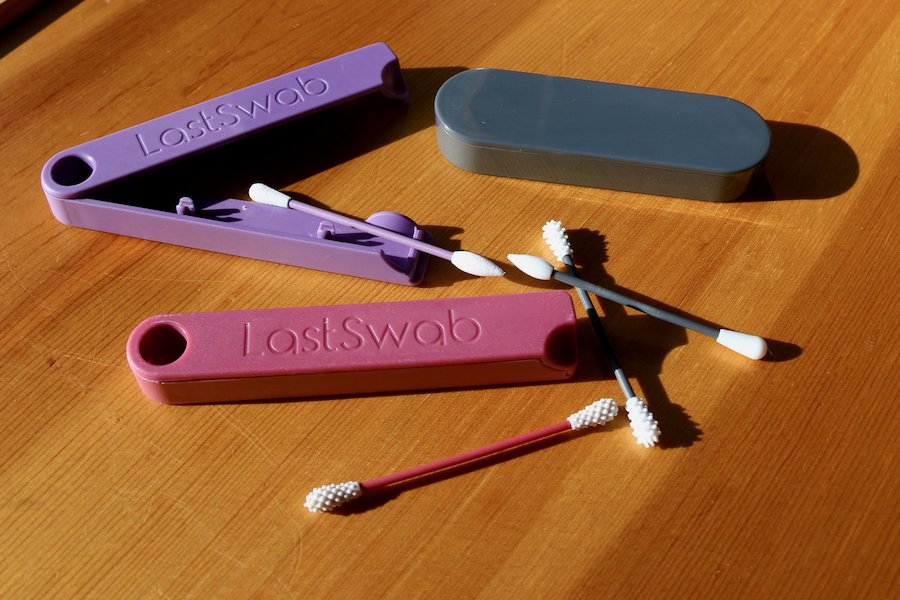
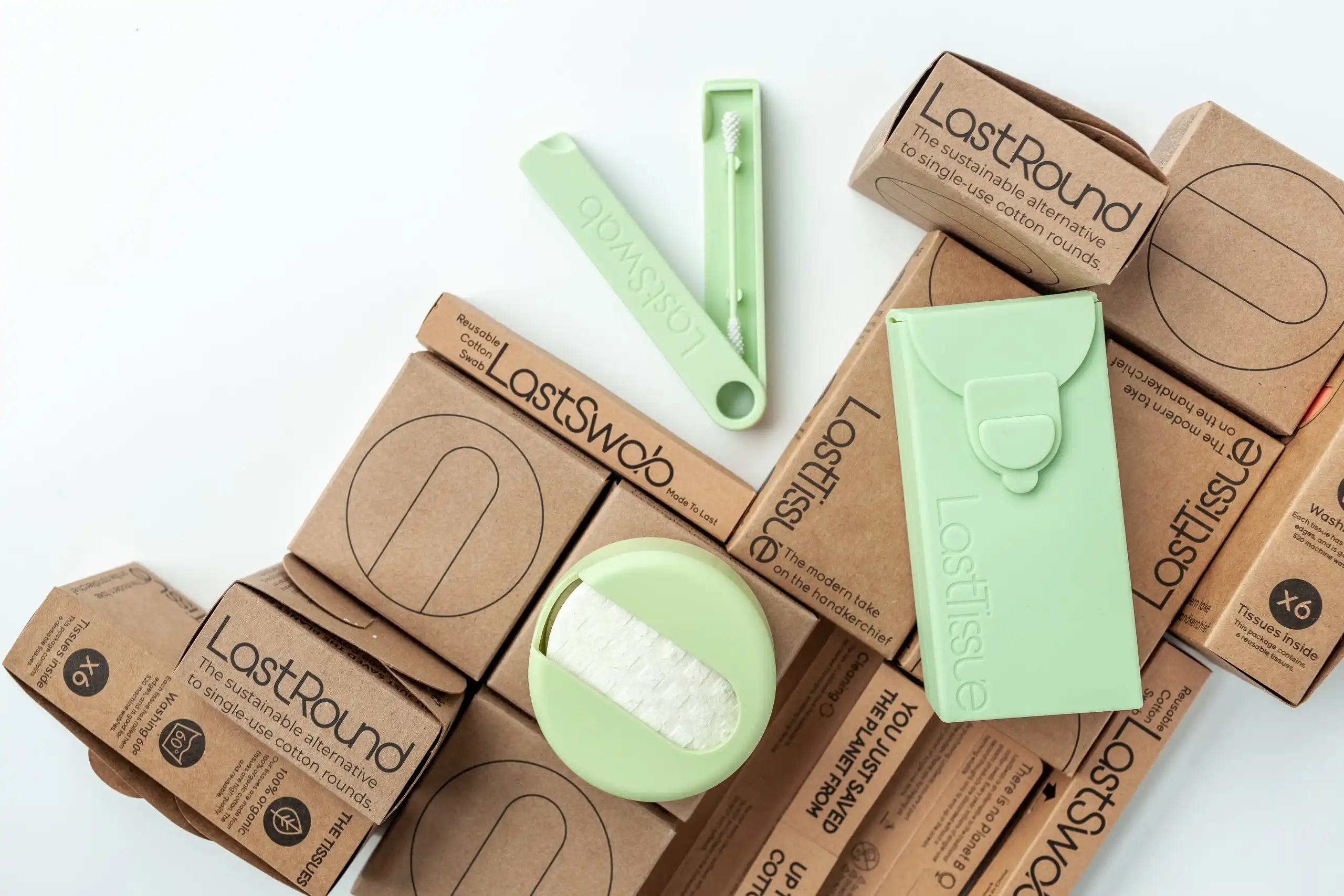

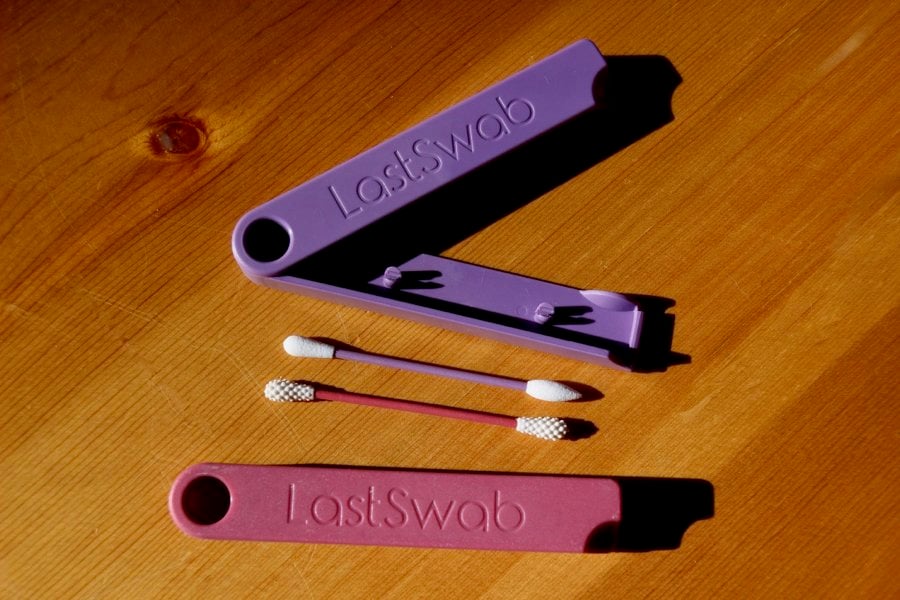


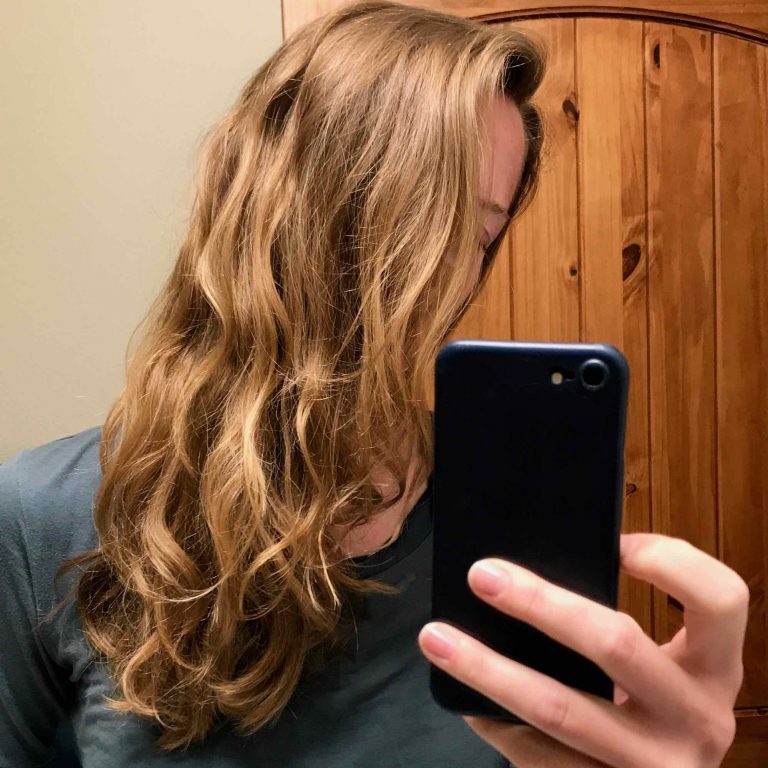
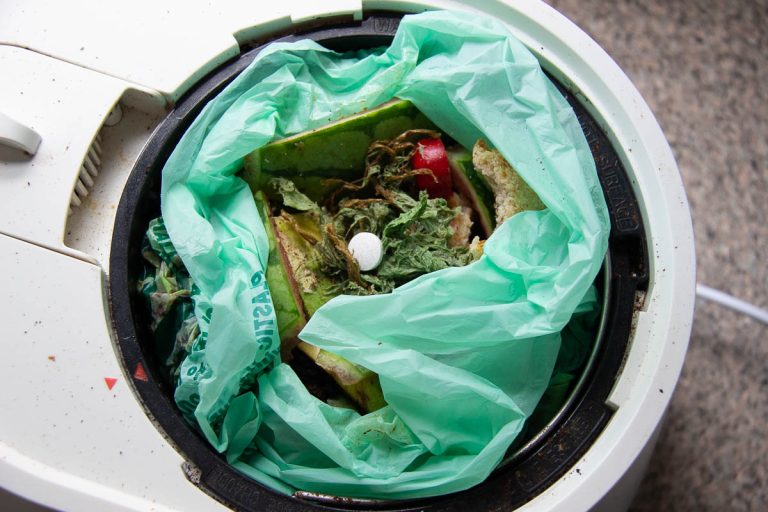
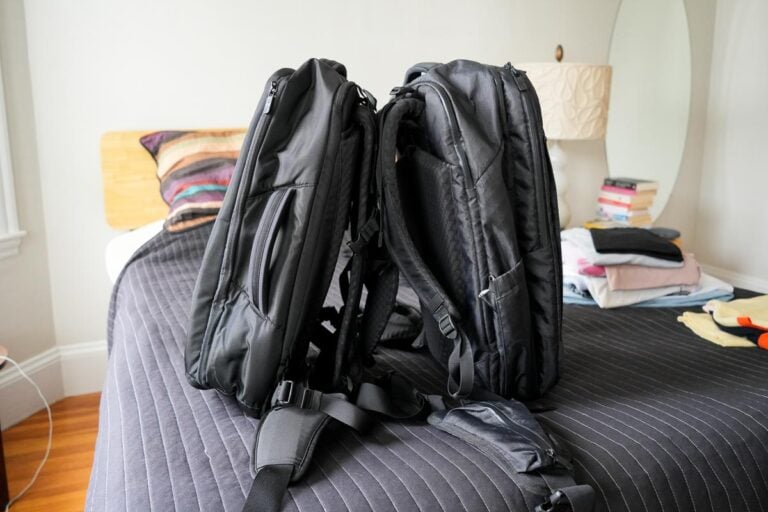

Hi,
I just finished reading about the reusable swab, thank you so much for your review. I’m trying to go”green” it’s challenging. My family uses cotton swabs for everything from cleaning our ears to artwork so your review was really helpful.
Hi Vicky,
Happy to help! I suspect LastSwab would work for some art projects, as long as paint and glue are washed off before they dry. The silicone tips are very slippery, so I don’t think things would stick to them too badly. If you do try them for that, I’d love to hear how it goes!
Otherwise, there are these cotton swabs from byHumankind (another eco-friendly brand that makes several products I really like) that are a better option than most (they’re plastic-free and made from fast-growing bamboo instead of wood).
Anyway, I completely understand that it’s challenging. Don’t get overwhelmed, just do what you can! Baby steps. That’s what I’m always reminding myself. 🙂
Thanks for your comment!
-Ketti
Bamboo swabs are truly a much better option. We use them and even though their wood shafts are more breakable than plastic ones, at least at the end of the day you can easily compost them.
Hi Schagné,
For most uses, I agree with you. It’s funny, I recently updated what I call my “master list” of plastic-free travel toiletries, and I wrote the exact same thing. I used the LastSwab for years, and I still think it’s good for some uses (especially for ears in the shower – that’s how my husband uses it). But for makeup, I now just use bamboo swabs from by Humankind, and I’m conscientious about making them last. (And anything is better than those terrible ones with the plastic stick.)
Thanks for your comment! I appreciate hearing your thoughts. 🙂
Ketti
I’m writing an article on my blog about going zero-waste, and I came upon this article and I never thought about companies “greenwashing”. I will definitely keep an eye open now when purchasing products!
Hi Rachel,
Yep, it happens a lot! And of course greenwashing gives the entire industry a bad name. There are a lot of great companies out there truly doing things better, and a lot just scamming to make a quick buck until people notice what they’re really about. Glad this was helpful for you! 🙂
Ketti
Hi Ketti,
Much appreciated this post. I saw an ad for a reusable product and thought what a better idea it was than the single-use items I occasionally use. Unfortunately it was from one of those dubious greenwashing companies you highlight.
Happily, I did a little research, found your blog, and so that dodgy company’s advertising only brought more custom to LastObject!
Warmly,
Shaun
So happy to hear this, Shaun! Thanks for commenting and keep in touch! 🙂
Ketti
This is terrifically interesting, so I’ll see if I can find any of the products in Canada. I DO find it distressing that you recommend using Amazon. Its dreadful employment practices and the fact that it usually just throws away returned items have made me swear to NEVER use Amazon.
Hi Annie!
Thanks for getting in touch! You can definitely order directly from LastObject for delivery in Canada. (They ship all over the world – from multiple warehouses, to reduce shipping emissions. That’s my affiliate link, which should automatically give you a 10% discount.)
As for Amazon, I absolutely agree with you, I just know that some people are going to go to Amazon to order things anyway, so I sometimes I mention when it’s an option. Frankly, I know that some people are going to go there anyway, I might as well receive the commission from Amazon instead of throwing it away. However, for the record, I definitely don’t “recommend” Amazon. That’s why I have dozens of links to order directly from LastObject, and just one or two for Amazon, and it’s why I explained the issue with Amazon and knock-offs. If you look through my other product reviews and articles, you’ll see it’s always the same. I recommend small businesses whenever possible, and always try to educate people and explain why they’re better, and why Amazon should only be a last resort.
Thanks for you comment and keep in touch! 🙂
Ketti
You’re not supposed to use cotton swabs to clean your ear, you’re just pushing it in. People have said this before not to use them. Look it up.
I’m talking about the cleaning outside areas of your ear, not digging in toward your brain.